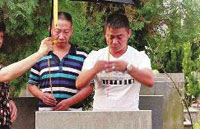Lawmakers consider support system for elderly with one child
By He Dan (China Daily) Updated: 2012-12-25 03:36Zhang, 65, lives with her 70-year-old husband in Zhenjiang, Jiangsu province.
"My daughter was a healthy and happy girl until one day she caught a fever and then fell unconscious and left us three days later," Zhang recalled. Her daughter died from acute cerebellitis.
Zhang, overwhelmed by the pain of losing her 26-year-old daughter, was diagnosed with breast cancer one year later.
"My daughter was my spiritual support and when she left, she took everything away from me," she said.
Zhang's husband, 70, has had high blood pressure and heart disease for years.
"As we have lost our only child, nursing homes will not let us in because we don't have a legal guardian to sign for us," she said.
"We are living in fear every day because we don't know who will be the last to die and who can arrange the funeral and affairs after our deaths," she added.
Guo Ping, an assistant research fellow at the China Research Center on Aging, said the new amendment, if passed, will act as a "legal basis" for giving more support to elderly parents whose only child passed away.
"Once articulated in law, government departments can stipulate more detailed policies to help these parents," he said.
Zhao Yinan contributed to this story.
Contact the writer at hedan@chinadaily.com.cn
- China's lunar probe confirms no water on the moon
- Minister: PLA to firmly protect maritime rights
- China raises alert level ahead of Typhoon Nida
- Japanese suspect detained in security inquiry
- China starts building its first polar icebreaker
- China warns of typhoon, floods
- New bus in south China makes emergency escape easier
- Drunk driving blamed for Taiwan bus accident
- Xi: Disaster relief must be improved
- China's push to improve output of research leads way









